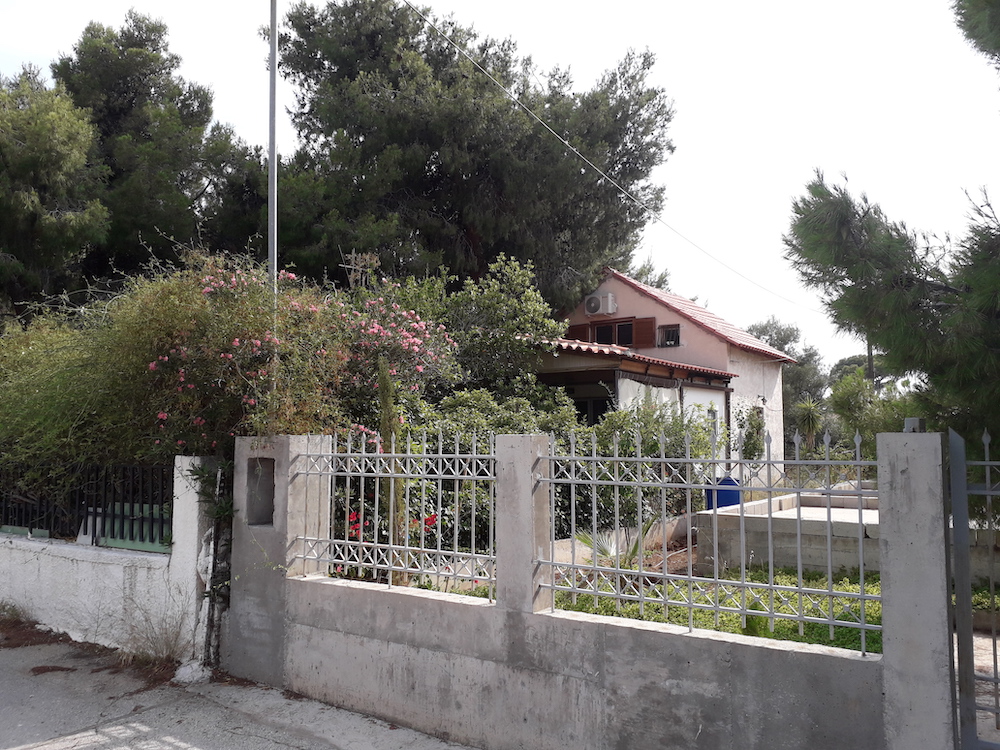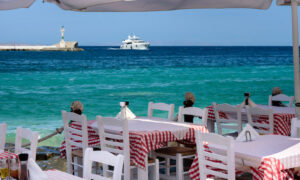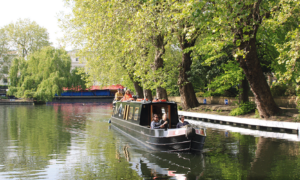It truly seems as if Greece, along with the rest of the world, is affected by climate change.
July 2019 was a strange month weather-wise in Greece. It began normally, with temperatures well over 30C. Then it turned cold – autumn temperatures and the weather changed. Usually July is hot and sunny, heralding the beginning of summer when everyone goes to the beach.
Not this year though.
STORMS
It all began on the 9th of July, when the sky lost its summer hue and turned grey. It stayed grey the following day and there were thunderstorms, more or less everywhere. Where I live was no exception and we were concerned about the pine branches which were flailing wildly in the wind.
Luckily only the thin young branches came down, reminding us that, sadly, the two huge pine trees in the garden might have to be hewn. The following day it was still grey and there were more thunderstorms.
It was bad here, but in the north of the country it was worse. On the morning of 11 July, we learned that Halkidiki, a well-known tourist destination in northern Greece, had been badly affected by the storms. Six people had died – most of them foreign tourists.
Apart from the spectacular lightning displays over the Gulf of Corinth and the falling branches, we were unaware of the seriousness of the weather situation. There had been some localised flooding in the nearby city of Corinth, we learned from the news, but this did not affect a large area of the city.
The unseasonal weather continued for a few more days and then it returned to normal although the temperature stayed just a little above 30 C. That’s 10 degrees cooler than we have become accustomed to in July.
EARTHQUAKE
Just over a week later [18 July], I felt the magnitude 5.1 earthquake which struck Athens. I was inside the house and felt it shake. My friend was in the garden, tidying the barbecue area. I thought he was dragging something really heavy across the concrete, judging by the noise.
I called to him and he came inside. He hadn’t heard or felt anything. We realised that it must have been an earthquake. I immediately checked online and found this.
I certainly wouldn’t have had time to move if it had been a stronger quake. We didn’t feel any of the aftershocks, the strongest of which measured 4.2 on the Richter scale. This happened on 28 July.
Earthquakes happen often, although they are usually small ones. It’s a good idea to familiarise yourself with the steps needed to stay safe in an earthquake, but remember that you only have seconds to act. Standing in a doorway or getting under a table is probably all you have time to do.
CICADAS
The cicadas stopped making their ‘dzidzi’ noise for the duration of the unseasonal weather. As the temperature rose, so did their noise. [In Greek they are called dzidzikakia.] However, they were soon loudly vociferous again.
One cicada, which was obviously more adventurous than the others found its way onto the mosquito netting we have put over the downstairs windows. It was quiet and stayed in place for several hours. It was interesting to see its underside. The cicadas that live on our pines have silvery wings and a dark-green body.
Shortly after that visit we were in the kitchen when we heard strange noises in the garden. We went outside and found one of the feral cats with a cicada hanging out of its mouth. I hadn’t realised that it ate them. On reflection, I think the cat enjoyed the chase more than its food.
Today the cicadas started to make a noise before sunrise. They stopped as the sun rose, but then began again around 8 a.m. It’s now 1 p.m. and their chorus continues. It will probably cease around midnight.
However, the cat doesn’t usually eat food it finds outside. We forgot to close the kitchen window when we went out for the evening and on our return, we saw that the cat had managed to get in through the netting and had eaten the homemade biftekia [beef burgers] which we had mistakenly left on the kitchen counter.

Spraying the house and garden
One of the household expenses you may not have budgeted for is pest control. Wherever you live, the inside and outside of your property needs to be sprayed in spring and autumn. If you live in an apartment block the person who organises the cleaning and maintenance of the
communal areas arranges for the property to be sprayed.
If you don’t live in a shared block of flats, you can ask neighbours to recommend a service, or search online. If you do this, start by searching for Rentokil. There will be other companies listed for you to choose from, as this one only operates in Athens and Thessaloniki.
All companies offer the same basic services. We had a rat problem which was sorted out by such a company. The cat didn’t help. She, it seems is only good for hunting beef burgers and cicadas. One reason for spraying is to have fewer cockroaches, as they are everywhere. A can of spray and branches of bay leaves are essential.
Bay leaves on the floor at the doors and along windowsills deter cockroaches, just as used coffee grounds deter magpies from the garden. All our coffee grounds are put to good use. Although spraying reduces the number of mosquitoes, it doesn’t eliminate them. Nets prevent them from getting into homes, though. Spraying didn’t have any effect on the cicadas, but there have been fewer ants on the trees.
July in Attica
This year July is a sad time as everyone is mindful of last year’s tragedy in Mathi, when wildfires swept through the coastal village, claiming more than 100 lives. Only now is there an effective clean-up operation.
This year, so far, people are being more careful, with the wildfires being mainly accidental. Those which weren’t have been rigorously investigated and there have been prosecutions.
These are probably a result of the Mathi fires and the fact that the new centre-right government, led by Kyriakos Mitsotakis, is keen to demonstrate its commitment to protect the environment. It is also taking steps to assist the victims of Mathi.
So far this year, temperatures have stayed below 40 degrees C, and August is almost over.
Autumn has arrived It’s mid-September now and there’s a definite autumn smell in the forest. There was a spectacular storm earlier this week with thunder rolling directly above the house.
The temperatures have dropped, and a few tortoises have visited the garden, presumably in search of water. We always have water for animals and birds at various points in the garden.
As for our water supply, it was continuous, although we had been warned that we would need to buy water from the town council and have it delivered to our tanks.
We have survived our first spring and summer here and are now looking forward to the colder months. We have to think about the best method of heating the house now.
We are waiting for a builder to do some necessary external repairs to the house in readiness for winter. We will be able to have barbecues again soon, when the threat of wildfires has gone. It was illegal to have any fire outside during summer.
I’m looking forward to roasting chestnuts soon.
About the author:

Lynne Evans is originally from Wales but is an inveterate traveller. She is passionate about writing and feels compelled to write something every day. Lynne has visited many countries in Europe and South Asia. Working as a freelance writer gives her opportunities to travel.
She’s currently living in her favourite country, Greece, in Athens. In the past, she was always leaving Greece and then returning. This time she wants to stay.
Here are more of Lynne’s posts about her adventures in Greece:
Expat Essentials: Lynne Evans’s expat guide to moving to Athens
Lynne Evans in Athens: An expat’s misadventures in the Greek healthcare system
Lynne Evans on daily life in Athens, the newly crowned European Capital of Innovation
Lynne Evans on Greece wildfires: ‘We can’t keep destroying Athens’ environment’
Lynne Evans in Athens: More tips to navigating the expat life in Greece
Lynne Evans: The trials, tribulations and absolute pleasures of living in Greece
Lynne Evans: The unvarnished truth about living in Greece














